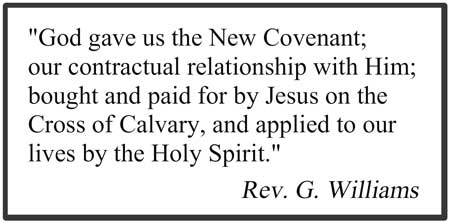 |
GWEA Monthly Messages
We Need to Live According to the New Testament
REVEREND GORDON WILLIAMS, APRIL 2023
|
 |
|
|
Jesus' resurrection from the dead, finalized the transition from the Old Testament to the New Testament. The Apostle Paul wrote, “But as it is, Christ has obtained a ministry which is more excellent than the old, as the covenant He mediates is better, since it is enacted on better promises. For if the first covenant had been faultless, there would have been no occasion for a second” (Heb. 8:6–7).
The Old Testament was based on works of righteousness, where the New Testament is based on grace. "For by grace you have been saved through faith, and that not of yourselves; it is the gift of God, not of works, lest anyone should boast" (Eph. 2:8-9).
 Paul treats the first covenant (Old Testament) as obsolete. "And what is becoming obsolete and growing old is ready to vanish” (Heb. 8:13). Jesus introduced the transition from the Old to the New Testament in the “the Seven Words from the Cross.” Let us examine them below:
1. “Father, forgive them; for they know not what they do” Lk. 23: 34).
Those who were crucifying Jesus represented all the sinners on earth. Jesus was the sacrifice, and His death on the cross paid for all the sin in the world - past, present and future!
2. Jesus said to the thief on the cross next to Him, “Truly, I say to you, today you will be with me in Paradise” (LK. 23:43). Up until the time Jesus died, the place of the dead was called Sheol, where the dead were in a death sleep and did not awaken (Eph. 4:8).
Paradise is a temporary heaven, where the dead who have received His Salvation are with Jesus until He returns and raises all of the dead (1 Cor. 15:51–58).
As there is a temporary heaven, Jesus also created a temporary hell for those who are unsaved. This is referred to as the Abyss, and where demons are sent.
When Jesus died, He woke up all the dead and put them in their places of judgement. Those who are saved do not go directly to heaven when they die, they go to the New Jerusalem. Jesus tells us, “No one has ascended into heaven, except the Son of Man” (Jn. 3:13).
3. “Woman, behold your son!” and to his disciple John, he said, “Behold your mother” (Jn. 26:27).
Jesus knew his fate, and so He gave the responsibility of His mother to his disciple John, rather than his four brothers.
"Now Jesus’ mother and brothers came to see him, but they were not able to get near him because of the crowd. Someone told him, “Your mother and brothers are standing outside, wanting to see you.” He replied, “My mother and brothers are those who hear God’s word and put it into practice” (Lk. 8:19-21).
4. “My God, my God, why have you forsaken me” (Matt. 27:46; Mk. 15:34).
Many people misunderstand this scripture. Jesus really is quoting Psalm 22 which describes His death and His Resurrection. The correct Greek translation is, “My God, My God, for one second, I thought you had abandoned me!”
5. “I thirst” (Jn. 19:28).
Jesus was experiencing what we think at first looks like human thirst. But there was another type of thirst that He was referring to - the thirst of righteousness. “Blessed are those who hunger and thirst for righteousness, they shall be satisfied” (Matt. 5:6).
Jesus was speaking about the “living water” (Jn. 4:13–14) – the Holy Spirit (Acts 2:4; Mk 16:16–20). The Holy Spirit can bring us through any crisis safely, even death!
6. “It is finished” (Jn. 19:30).
When Jesus said this, He was not referring to His death, He was referring to the Old Testament Covenant and the brotherhood between Judah and Israel. It was annulled which was prophesied (Zech. 11: 15) when Judas threw the 30 shekels of silver into the Temple.
Jesus’ death ended the era of the Old Testament. God no longer accepts the Old Covenant as law, except where some of it was included in the New Testament. It was finished and paid in full as prophesied; replaced with the New Testament Covenant of which Jesus is the New High Priest (Heb. 7:20–25).
The Temple in Jerusalem, as Jesus prophesied (Matt. 24:1, 2; Mk. 13:3–13; Lk. 21:5–1), was destroyed and will never be rebuilt. Paul tells us that the Temple in Jerusalem has been replaced with a New Temple. Those who are saved, and have received His full Salvation package, are the new temple of the Holy Spirit.
"Do you not know that you are God’s Temple and that God’s Spirit dwells in you? If anyone destroys God’s temple, God will destroy him. For God’s temple is holy, and that temple you are” (1 Cor. 3:16 –17).
7. “Father, into your hands I commit my spirit” (Lk. 23:46).
Jesus is letting us know that anyone who has received the Baptism of the Holy Spirit (pneuma in Acts 2) into his or her life can die without any fear.
Our Heavenly Father can be trusted to look after us both in life and in death. The Holy Spirit is our guarantee or proof that we have a reservation in the New Jerusalem. Our names are written in the Book of Life (Rev. 3: 5; 21:27). When we use the fifteen Gifts of the Holy Spirit in ministry (Rom. 12: 6–8; 1 Cor. 12:8–10), they confirm the Holy Spirit indwelling in us.

If you would like to receive Salvation, the Baptism of the Holy Spirit or prayer for your needs, please come to one of our meetings and/or contact me.
Easter Blessings to you and your family!
Yours in Jesus Christ,
Copyright © 2018. The Gordon Williams Evangelistic Association. All rights reserved
|
Jesus made it clear that there is no alternative route to eternal life with God. He said, "I am the way, and the truth, and the life; no one comes to the Father but by me" (John 14:6). No matter how many routes other religions claim are available, Jesus declared that there is only one way - salvation through His shed blood. Salvation is a free gift. There is no age-limit nor sexual preference, no intelligence standards nor financial requirements; it can't be bought nor earned; and it is not guaranteed by church attendance any more than hanging around a garage guarantees that a person will buy a car. So how does one become adopted by God? It really is very simple, and can happen in a variety of ways such as: 1) When praying alone. 2) Praying with another person who will give encouragement and support. 3) By responding to what is called an "altar call," where an individual walks to the front of a church during a service and prays publicly to invite Jesus Christ to be his/her personal Saviour and Lord. People tend to feel most comfortable when they can put things into boxes. Attempting to categorize Christians as evangelical, charismatic, conservative, fundamentalist, liberal, or whatever serves to clarify the differences between Christians. Taking different corners within the general arena of Christianity - like Presbyterian, United, Baptist, Pentecostal etc. - is a very "natural" thing. However, that doesn't mean it's "normal" for people who have a relationship with Jesus. Unfortunately, in the Christian realm, what happens is people not only separate themselves into boxes with sides and lids, but they dissect the Christian experience to the extent that they end up with an autopsy and a dead body of Christ. This so-called "categorization" of Christians disqualifies them all from effective ministry to people who need their help and encouragement. We should not be surprised when people ask, "Why should I want to be a Christian? Those people can't even get along with each other!" When people see disunity in the church, the whole message of the Gospel suffers a loss of credibility. Paul's example is given as a guide for us. He said, "I have become all things to all men, that I might by all means same some" (1st Corinthians 9:22). People need to see that Christians do not reject those who differ from them in the way they doth their i's or cross their t's. The body of Christ needs to be seen as a bonding together of individuals who love and respect each other enough to allow each person to grow in Jesus Christ as he and she is led by the Holy spirit. |
